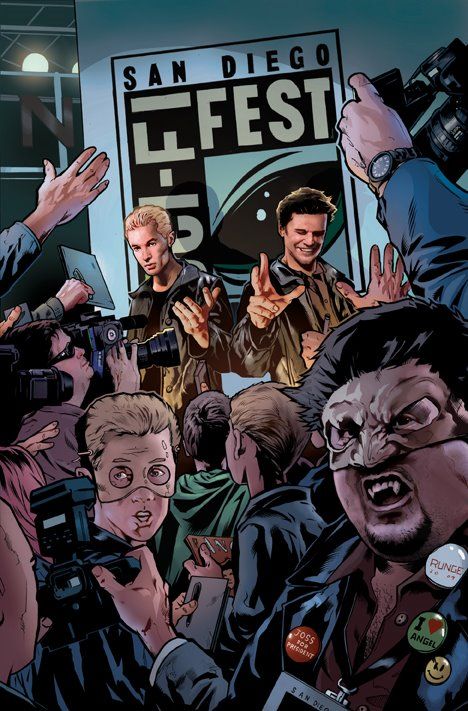Despite being a big fan of "Angel" and the Buffyverse in general, the "Season 6" continuation of the series never quite rang true with me. Much of that was down to how far removed the series had become from the TV series, with the status quo radically altered and the street-level detective work complete discarded in favor of "Lord of the Rings"-style epic fantasy. Add to that a convoluted plot and a look that never clicked with me, and you'll probably start to wonder why I'd bother to pick up the series again.
However, with the series back in Los Angeles, on Earth, following a cosmic almost-reset, things are looking much more familiar and, as a result, much more reminiscent of the show I used to enjoy. The opening pages ultimately convinced me to buy it, presenting a well-judged Hollywood-based parody of Angel's time in hell (featuring Nic Cage as "Angel," and Hurley from "Lost" as a minigun-toting "Gunn") being shown in the Angelverse's comic-con equivalent.
Maybe it's purely the change of scenery, or the reduced scope of the story, but in this issue, the characters felt like themselves in a way that they never did throughout "After the Fall." For the first time, I can also see the ability in Lynch that led Whedon to select him as the writer of "Angel" in the first place -- it's just a shame his opening story arc wasn't up to the same standard.
The story feels much more like classic Angel, as the crew (such that they are) find themselves prowling around a comic convention looking for a sacred weapon. Gunn and Illyria are off in a miniseries, so the task falls to Angel, Spike and the Groosalugg. In predictable Whedonverse manner, things aren't as straightforward as they seem -- a spell causes the convention attendees to become their costumes, with particularly hilarious consequences for one of the fang-gang.
Admittedly, the concept might be familiar to Buffy fans who remember season 2 -- sure to make up a substantial portion of the readership, if not to the totality of it -- but it's easy to forgive the recurrence of ideas, because what sells the book is the dialogue. Lynch's characters spark off one another in precisely the manner you'd expect, and it's hard not to smile at the humor dotted throughout the book.
Stephen Mooney returns on art, and his pencils are perfectly up to the task of rendering the characters and cast in a familiar way. The storytelling is decent enough, but some heavy inking and a lack of detail in the panels leave it looking a bit rushed and workmanlike -- but let's be fair, it's still superior to most licensed comics.
"Angel #26," then, was an unexpected surprise from a writer and series I'd previously written off. It hasn't set the world alight, but compared to how it used to be, it's a vast improvement. I'll definitely be back for the next issue.

